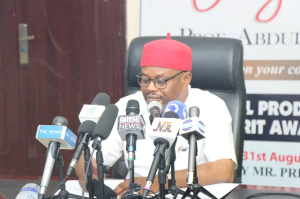Minister of Innovation, Science and Technology, Mr Uche Nnaji, has reiterated the need for Nigeria to produce green hydrogen as sustainable pathway for alternative energy generation.

Nnaji stated this at the Kick-Off Meeting/Stakeholders’ Interaction on the Nigeria 4H2 Project (Nigeria for Hydrogen) in Abuja on Tuesday, January 30, 2024.
The meeting was titled “A Critical Analysis of the Potentials, Infrastructure and Other Enabling Framework Conditions for Green Hydrogen to Fertilizer Production in Nigeria”.
Green hydrogen is a clean burning fuel that eliminates emissions by using renewable energy to electrolyse water.
It also separates the hydrogen atom within it from its molecular twin oxygen.
The minister said that green hydrogen serves as viable and sustainable pathways for alternative energy generation among others.
“It offers excellent potential to address the detrimental impacts of climate change occasioned by the release of greenhouse gases from fossil fuels into the environment.
“As you are very much aware, exploiting Nigeria’s green hydrogen potential is at the heart of the Renewed Hope Agenda of President Bola Tinubu.
“Therefore, there is no better time for the country to plug into this opportunity to avoid playing catch-up with the western world.
“As a country, Nigeria must play a critical and leading role in the global energy transition,” he said.
According to him, the country enjoys abundant sunshine, with an average of 11 hours of sun daily. Hence, it has immense solar radiation potential to power electrolysers for hydrogen production.
“This potential makes Nigeria a critical stakeholder in the world energy transition.
“The concerted efforts of scientists, engineers, policymakers, and industries are necessary to achieve the tall vision of a net zero carbon environment and sustainable agriculture.
“The great importance placed on considering different pathways to industrialising the country accounts for the presence of critical ministers/ministries in this event.
“We must explore new sources and advance in science and technology.
“Thus, we are partnering with the consortia as a service ministry to connect all stakeholders in the hydrogen sector’s upstream, midstream, and downstream sectors,” he said.
Nnaji said that the ministry also intends to facilitate an environment for co-development of a national policy framework for green hydrogen by all stakeholders.
“This will ensure the sector’s rapid, robust and all-inclusive development.
“I believe at the end of this meeting, all the stakeholders would have jointly identified, and situated the expected players in the emergent hydrogen industry value chain in Nigeria,” he said.
Also speaking, Mr Ekperikpe Ekpo, Minister of State for Petroleum Resources (Gas), said that the country was endowed with rich oil and gas resources.
He said that the country occupies a unique position to leverage its expertise and infrastructure in transitioning towards our hydrogen potential.
Ekpo was represented by Amb Nicholas Ella, a Permanent Secretary in the Ministry.
He said that the prospect for synergy between conventional and sustainable energy is vast, and urged stakeholders to seize the opportunity of the workshop to diversify their energy portfolio.
According to him, ther workshop serves as a nexus for collaboration where industry leaders, policymakers, and innovators converge to carve a sustainable path forward.
“Together, let us explore the delicate balance between maintaining the resilience of our oil and gas sector and fostering the growth of green technologies.
“In my capacity as the minister of state, petroleum resources – gas (HMSPRG), I am dedicated to steering this transition with strategic policies that align with our national interest.
“Let us collectively pioneer a roadmap that not only ensures the sustainability of our energy sector but also position the country as a key player in hydrogen technologies, ’he said.
Prof. Kehinde Ogunjobi, Interim Executive Director, West African Science Service Centre on Climate Change and Adapted Land Use (WASCAL), said that the meeting was a proof of stakeholders’ commitment to inclusivity and collaboration in green hydrogen.
“We have gathered here not only as individuals but as representatives of diverse sectors-government, industry, academia, and civil society.
“This workshop is designed to be a space for open dialogue, where each perspective, contribution and reflection will be instrumental in shaping the roadmap.
“It will guide us toward a future where green hydrogen and fertiliser production will contribute to driving sustainable development in Nigeria,” he said.
By Constance Athekame
